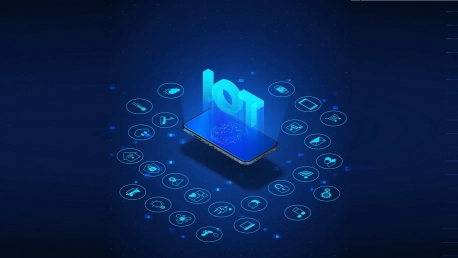The healthcare sector is currently undergoing a seismic shift with the integration of the Internet of Things (IoT), offering unprecedented opportunities for enhanced patient care and operational efficiency. This article delves into the burgeoning domain of IoT healthcare, examining the market dynamics, driving factors, opportunities, and the challenges that come with the territory.The burgeoning IoT healthcare market stands on the cusp of revolutionizing the way health services are delivered. With major corporations leading the charge, the sector is ripe with potential for improved patient monitoring, efficient workflow management, and cost-effective healthcare systems.
The Advent of IoT Healthcare Innovations
Harnessing IoT for Enhanced Patient Care
IoT technologies have taken patient care to a new frontier with their ability to facilitate continuous monitoring and immediate data analysis. The traditional healthcare model, built on periodic checkups and follow-ups, is being revamped into a dynamic, real-time system that prioritizes the patient at every step of the way. With IoT, devices can now track vital signs, administer medication, and even alert healthcare providers to potential concerns before they become acute, enabling a proactive approach to patient wellness.
Workflow Optimization and Cost-effectiveness
Within the medical world, IoT is becoming a cornerstone for streamlining operations. Smart devices and systems are diminishing the prevalence of manual errors and automating administrative tasks, allowing healthcare professionals to devote more time to patient care. From smart scheduling to inventory tracking, IoT is trimming the excess from healthcare delivery, making it as efficient and cost-effective as possible. Not only do these advancements lead to financial savings, but they also instigate system-wide improvements in the quality of service, evidencing the profound impact IoT has on the healthcare industry’s infrastructure.
The Growth Drivers of IoT Healthcare
The AI Evolution and Its Impact on Healthcare
Artificial intelligence is a game changer in the synergy it creates with IoT in healthcare. AI’s potent analytical capabilities, when fused with IoT devices, enhance diagnostics and treatment modalities, offering a sharp increase in accuracy and efficacy. Predictive analytics, powered by AI, is not only revolutionizing early detection and prevention but is also transforming patient care into a tailored experience. The impact is substantial, paving the way for personalized medicine and reshaping the healthcare paradigm to be more patient-centric and results-oriented.
Investment Influx and the Geriatric Factor
The healthcare industry is witnessing a surge in investments towards IoT implementations, a trend buoyed by an aging population with complex medical needs. Chronic diseases, which are prevalent among the elderly, require ongoing monitoring and management—demands that IoT is uniquely poised to meet. This explicit need for sustainable, long-term care solutions coupled with financial backing serves as a significant engine of growth for the IoT healthcare market. As populations age globally, this segment promises to remain a robust contributor to the market’s expansion.
Embracing IoT: The Opportunities and Challenges
Operational and Clinical Improvement Demands
Healthcare establishments are actively seeking ways to boost operational and clinical proficiency, and IoT stands out as a beacon of innovation in this quest. The fervent interest spans across different segments, including pharmaceutical and biotech firms, which are adopting IoT to refine research, enhance drug formulation, and streamline production processes. This dimension of IoT application extends the scope of technological integration beyond immediate patient care into the realms of healthcare system efficiency and pharmaceutical excellence.
Overcoming Interoperability and Security Challenges
While the horizon is promising for IoT in healthcare, the pathway is strewn with systemic hurdles. One primary concern orbits around interoperability—the seamless exchange and interpretation of data across various devices and systems. Compounding this is the looming threat to data privacy and security, a realm of high stakes in healthcare. Effective measures to address these concerns are paramount for maintaining the integrity of healthcare institutions and protecting sensitive patient information from breaches, thus fostering a robust foundation for IoT in this sensitive industry.
Market Analysis and Insights
Exploring IoT Healthcare Applications
Diving into the rich tapestry of IoT applications reveals a sector pulsating with innovation across multiple dimensions. Telemedicine, for instance, is shrinking distances and making healthcare accessible to remote or underserved populations. Connected imaging technology is providing instant results, reducing wait times for patient diagnosis. Daily regimens like medication management are being transformed by IoT, ensuring that adherence to prescription protocols is consistent and monitored. These applications are not mere incremental advances; they constitute a radical overhaul of healthcare delivery systems.
The Role of Key Players and Regions
The healthcare industry is on the brink of a transformation powered by the Internet of Things (IoT). This shift paves the way for revolutionary patient care advancements and operational efficiencies. The IoT in healthcare is generating significant opportunities, spearheaded by major industry players, aiming to revolutionize patient monitoring, streamline workflow, and create cost-efficient healthcare systems.These innovations promise benefits such as real-time health tracking and the ability to manage chronic conditions more proactively. Moreover, healthcare professionals can leverage data from IoT devices to make better-informed decisions, potentially leading to improved outcomes.Nonetheless, this evolving market also faces hurdles, including concerns about data security, patient privacy, and the integration of diverse technologies. To realize the full potential of IoT in healthcare, the industry must navigate these challenges with strategic planning and robust security measures. As we advance, IoT in healthcare could become integral to a more responsive and sustainable healthcare model.









